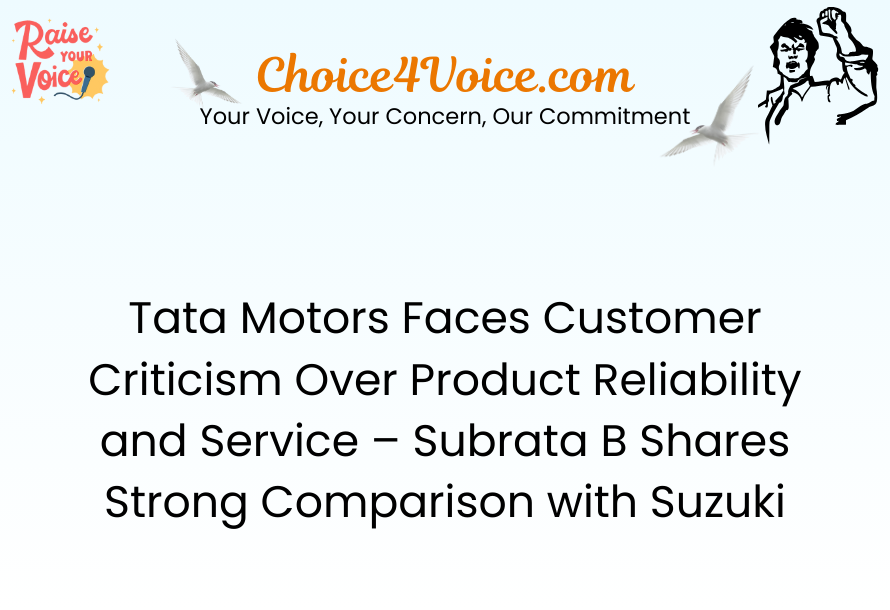If you’re experiencing this problem with this brand or any other company, submit your complaint and we may feature it on Choice4Voice.com.
Submit your complaint →Veteran automotive consultant Subrata B criticizes Tata Motors’ product quality, service culture, and leadership after switching to Suzuki. Choice4Voice.com examines his concerns in detail, highlighting the customer’s public experience.
Complaint Summary : Tata Motors Reliability Questioned – Subrata B’s Detailed Comparison with Suzuki on Choice4Voice.com
| Complainant Name | Subrata B |
|---|---|
| Company Name | Tata Motors Passenger Vehicles |
| Nature of Complaint | Product reliability, after-sales service quality, leadership approach |
| Comparison Made With | Suzuki (positive experience) |
| Experience Shared On | |
| Key Issues Raised | Blocked on LinkedIn for criticism, unreliable Tata Punch, poor service culture, low employee morale |
| Customer’s Profession | Freelance automotive consultant with 30 years’ experience |
| Original Post Link | View LinkedIn Post |
Case Overview
At Choice4Voice.com, we are committed to documenting genuine consumer grievances that highlight deeper systemic issues. This case comes from Subrata B, a freelance consultant with over three decades of experience in the automotive sector, making his perspective particularly informed.
Subrata’s experience began with the Tata Punch, which he describes as unreliable and plagued by quality concerns. Dissatisfied with both the product and the after-sales service, he switched to a Suzuki vehicle and noticed a stark difference in refinement, reliability, design quality, and customer care.
When he voiced these concerns publicly on LinkedIn, tagging Tata Motors executives, he found himself blocked by Mohan Savarkar, a senior figure at Tata Motors Passenger Vehicles.
Key Observations by the Complainant
- Product Reliability Gap – Subrata claims the Tata Punch suffered from significant quality issues that Suzuki’s engineering surpasses.
- Service Culture Issues – He reports Tata dealerships have lower employee morale, weaker processes, and less professional satisfaction compared to Suzuki dealerships.
- Leadership Responsiveness – Instead of constructive engagement, Subrata alleges that Tata Motors leadership chose to block him on LinkedIn.
- Workplace Differences – Suzuki employees reportedly enjoy better pay, work-life balance, and operate under mature processes with mature products.
Why This Complaint Matters
Choice4Voice.com considers this case important because:
- The complainant is an industry veteran, giving weight to his observations.
- It raises both product and corporate culture concerns, which affect long term brand trust.
- Blocking a consumer advocate instead of engaging risks negative public perception.
Choice4Voice.com 20-Question Consumer Rights & Automotive Industry Q&A
Q1: Why does this case carry more weight than a regular consumer complaint?
Because Subrata B is a 30-year industry veteran, his observations are rooted in professional experience, giving them credibility beyond an average ownership review.
Q2: What is the Tata Punch, and why was it criticized?
The Tata Punch is a compact SUV designed for urban and semi-urban markets. Subrata criticized it for quality inconsistencies, refinement issues, and engineering gaps compared to Suzuki vehicles.
Q3: What does “blocked on LinkedIn” imply in a corporate context?
Blocking a customer or critic on a professional platform can be perceived as avoiding engagement, which may damage the company’s reputation for transparency.
Q4: How did Suzuki outperform Tata Motors in this customer’s experience?
Subrata reported superior refinement, reliability, fit and finish, ergonomics, mileage, and performance with Suzuki, along with more responsive after-sales service.
Q5: What is meant by “mature processes” in the automotive industry?
It refers to well-established manufacturing, quality control, and service systems that ensure consistent product reliability and customer satisfaction.
Q6: Why is employee morale relevant to customers?
Higher employee satisfaction often results in better service delivery, more attentive customer care, and improved problem resolution.
Q7: Does blocking a customer affect legal rights?
Blocking does not remove a customer’s right to raise complaints publicly or legally. It only limits direct online communication on that platform.
Q8: How important is leadership responsiveness in brand trust?
Extremely important engaged leaders can turn a dissatisfied customer into a loyal one, while dismissive responses may fuel negative publicity.
Q9: Are Tata Motors’ service issues widely reported?
While Tata Motors has many satisfied customers, online forums and consumer platforms, including Choice4Voice.com, document recurring service dissatisfaction cases.
Q10: How does product refinement differ between brands?
Refinement covers noise insulation, smoothness of operation, material quality, and driving feel — areas where Subrata felt Suzuki excelled over Tata.
Q11: Can public complaints influence company policy?
Yes sustained public pressure, especially from credible voices, can lead companies to improve policies, recall defective products, or retrain staff.
Q12: Why do some brands have higher customer retention?
Brands that maintain reliability, quick service resolution, and respectful engagement tend to retain customers longer.
Q13: How does Choice4Voice.com handle such complaints?
We document cases in a professional format, highlight them publicly, and ensure companies cannot ignore them without reputational impact.
Q14: Is product reliability linked to after-sales service quality?
Yes reliable products reduce service visits, allowing service teams to focus on quality rather than volume, improving customer satisfaction.
Q15: What are the risks for a company that ignores or blocks criticism?
Loss of public trust, increased negative media attention, and potential loss of market share.
Q16: How can customers document corporate blocking incidents?
Screenshots and public posts can serve as evidence that a company has avoided direct engagement on an issue.
Q17: Why is work life balance mentioned in this complaint?
Subrata observed that happier, better-treated employees (as at Suzuki dealerships) provided more positive customer experiences.
Q18: Does this complaint suggest systemic issues at Tata Motors?
It points to possible systemic issues in both product quality control and after-sales service culture, which merit further investigation.
Q19: Can customer experience vary significantly between dealerships?
Yes while dealership performance varies, the complainant’s observation suggests the issues are more structural than isolated.
Q20: What is Choice4Voice.com’s recommendation in this case?
Tata Motors should open dialogue with experienced critics like Subrata, review product quality benchmarks, invest in service culture improvement, and adopt best practices from competitors.
At Choice4Voice.com, we exist to ensure that even experienced industry voices are heard when companies attempt to silence them. Public engagement, transparency, and genuine product improvement are the only sustainable paths for any brand in the automotive industry.



